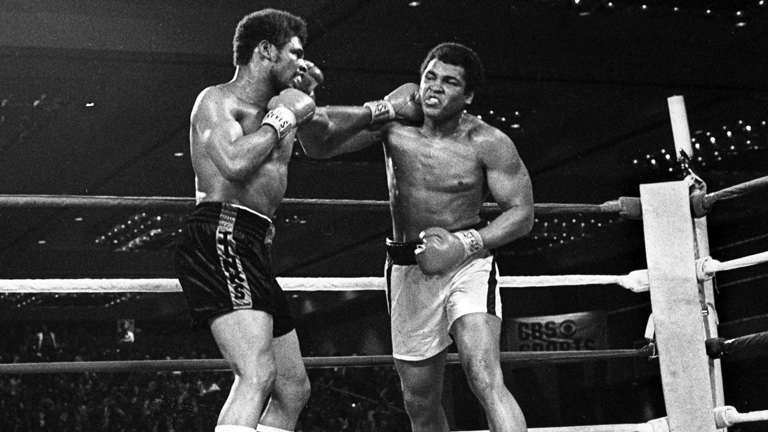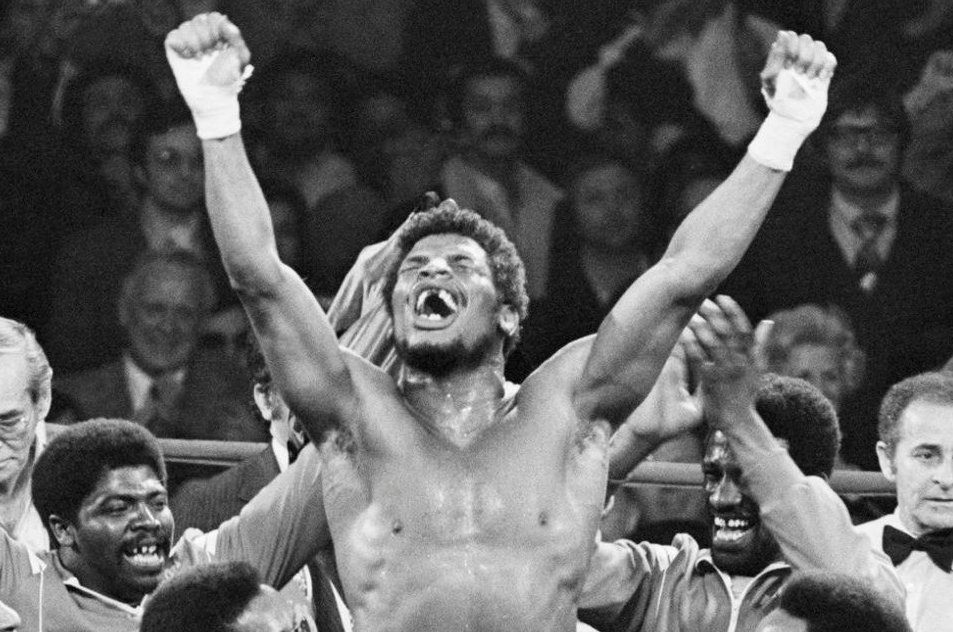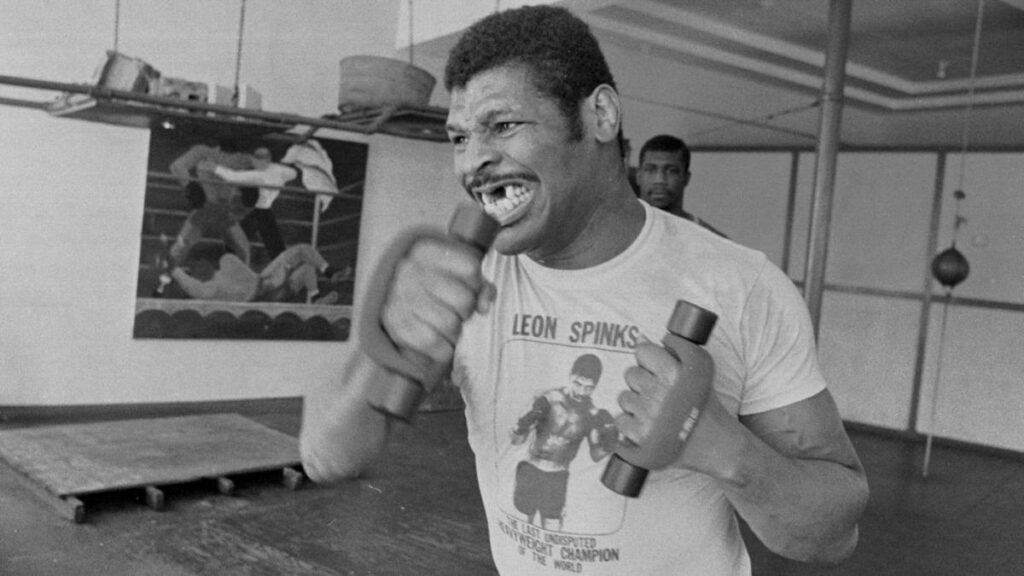IBHOF inductee Graham Houston pays tribute to former world heavyweight champion Leon Spinks who passed away on Friday.
Olympic gold medallist and briefly world heavyweight champion, Leon Spinks, who died on February 5 at the age of 67, will likely be remembered as much for his wild and crazy life as for his upset victory over Muhammad Ali.
Spinks reached the heights when he defeated Ali at the Las Vegas Hilton in February 1978. His fall was quick. In a lacklustre showing, he lost the title to Ali in their rematch at the Superdome in New Orleans seven months later. Spinks never fully recaptured the sort of driving intensity that took him to victory over Ali in their first meeting.
Perhaps success came too soon for Spinks. A former US Marine, raised in the poorer section of St. Louis, he won the Olympic light-heavyweight gold medal in the 1976 Montreal Games; older brother Michael won the middleweight gold.
Leon had boxed just seven times professionally when, as a 24-year-old, he went in with Ali. “I knew what it took,” Spinks told the Camden (New Jersey) Courier-Post in a 1985 interview. “You had to stay on Ali and punch all the time. Like Joe Frazier. I learned from how Joe Frazier fought him. I put Joe Frazier’s style with mine and I beat Ali.”
But Spinks couldn’t handle success. Just two months after beating Ali, Spinks was stopped by police for driving without headlights at night and drugs possession. Spinks said the drugs — small amounts of marijuana and cocaine — must have been planted on him, not by the police but by a person or persons jealous of his success. Charges were dropped.

Traffic violations piled up: Driving without a licence, speeding, driving the wrong way on a one-way street.
It seemed as if Spinks had lost his focus. A faded Ali comfortably outboxed him in the rematch. Spinks’ promoter, Bob Arum, talked of chaos in the new champion’s camp leading up to the Ali rematch. Philadelphia trainer George Benton was brought on board but left Spinks’ corner during the fight. “I said earlier that Ali couldn’t win the fight but Spinks could lose it, and that’s exactly what happened,” Benton told the reporters.
Bob Arum lamented that Spinks “wasn’t mature enough to accept the responsibility of being the world heavyweight champion”.
Maybe it could have all turned out differently if Spinks hadn’t reached the pinnacle as quickly as he did. He showed enormous potential when he pounded Cuba’s Sixto Soria into defeat in the third round in the Olympic gold-medal bout. As I recall, Soria had been considered one of the biggest punchers at any weight in the Games, but Spinks took the Cuban’s best shots, knocked him down in the first round and dropped him again in the third.
The CBS TV network signed the Spinks brothers to professional contracts. When John Conteh defended his light-heavyweight title against Len Hutchins at Liverpool Stadium in March 1977, Spinks was on the undercard as an added attraction for US TV viewers. Spinks flattened Peter Freeman, the English Central Area heavyweight champion, with a big right hand in just 86 seconds that night. Although the bigger man, Freeman had what could be called a questionable chin and I remember thinking, at ringside, that it would be just a matter of time before Spinks nailed him.
After five KO wins in a row Spinks was matched tough, as they say in the trade, fighting a 10-round draw with the seasoned Scott LeDoux, who outweighed him by 10 pounds. Then came the win that earned him the fight with Ali, a unanimous 10-round decision over Italian champion Alfio Righetti, who had won 27 fights in a row, in November 1977.
Spinks, just a cruiserweight by today’s standards, was giving away 16 pounds in weight but outfought and outworked the taller Italian boxer.
Muhammad Ali was a ringside spectator and commented: “This man’s a lot like Joe Frazier. He’s young, relentless. I’ll have to take him serious.”
At the time it seemed as if Ali was just saying nice things about Spinks to hype their fight, which had already been scheduled for the CBS network on February 15 of the following year. But Ali, aged 36, was in decline and Spinks seized the moment. He came out fast, backing Ali up on the ropes and firing in body punches from both sides. “Spinks can’t keep that up,” Ferdie Pacheco, the Fight Doctor, noted in the TV commentary. But Spinks could keep it up.

There was a flash of the old Ali as he moved and jabbed in the 11th round but Spinks came on strongly and seemed to hurt the old champion with a right hand. By the 14th Ali was looking weary and Spinks was fighting strongly.
The 15th round of Spinks vs Ali was arguably one of the greatest last rounds in heavyweight history. It was punch for punch, with Ali fighting through exhaustion to land right hands. But Spinks had the last word, rocking Ali with a right hand in the closing moments of the fight.
Spinks seemed a clear winner but judge Art Lurie had Ali winning by one point, a score that was booed. Pacheco, who had Spinks winning, had words of praise for the new champion. “This gentleman’s got to be given every credit in the world,” Pacheco said. “He beat an Ali that’s 36, but he beat an Ali that’s all heart.”
After the fight, Spinks told the CBS in-ring interviewer, Bob Halloran, that he knew he had to dedicate himself to training if he was to beat Ali. But he never again reached that degree of dedication.
The WBC withdrew recognition of Spinks as heavyweight champion for failing to agree terms to meet mandatory challenger Ken Norton. Spinks understandably preferred to defend the WBA championship for a purse of $3 million in a rematch with Ali. A crowd of 63,352 was in attendance at the Superdome. “Never have so many paid so much for so little,” columnist Jim Murray wrote in the Los Angeles Times. “Spinks got to be an instant millionaire with less expenditure of effort than a guy opening cab doors. … Many fighters have had a meteoric rises in fisticuffs. Leon Spinks will be famous for his meteoric disappearance.”
It was all pretty much downhill for Spinks after the Ali rematch. South Africa’s Gerrie Coetzee blasted him to defeat in the first round of a WBA elimination match outdoors in Monaco in June 1979. Spinks started aggressively but a right hand from the much bigger Coetzee sent him to the canvas for the first of three knockdowns and it was all over in two minutes, three seconds, in what NBC TV network commentator Dick Enberg called “an amazing upset”.

Spinks felt he still had something to offer if he just persevered. “I’m just a human being, trying to make the best of it,” he told the Associated Press in a November 1979 interview. “But it all happened too fast for me. I made mistakes. I couldn’t deal with society.”
There was a brief revival in Spinks’ fortunes. “He’s still a compelling figure to America’s sporting public,” CBS TV commentator Tim Ryan told viewers before Spinks’ fight with Spain’s two-time heavyweight title challenger Alfredo Evangelista in Atlantic City in January 1980.
Evangelista, the former European champion, wobbled Spinks in the second round. Spinks bobbed and weaved, survived the crisis and came back to break down his Uruguayan-born opponent with what CBS TV analyst Gil Clancy described as “beautiful combinations”. Bleeding from the mouth and looking disheartened, Evangelista was counted out on his knees. “This was a fight I had to win,” Spinks said afterwards.
And in probably his best post-Ali performance, Spinks stopped Bernardo Mercado, a heavy-handed Colombian who was based in Reno, Nevada, in the ninth round of a scheduled 12-round WBC title eliminator. The fight was on the undercard of Larry Holmes’ one-sided win over Muhammad Ali outdoors at Caesars Palace, Las Vegas in October 1980.
“Spinks’ strategy to stay on top of Mercado worked to perfection as he didn’t give the taller Mercado room to sit back and use his reach advantage with long jabs,” Royce Feour reported in the Las Vegas Review-Journal.
In his title challenge against Holmes the following June, Spinks enjoyed a good second round with crowding pressure but Holmes blasted him with a series of heavy right hands in the third. Spinks survived a knockdown but was pinned in a corner and taking punishment when his corner threw in the towel.
Spinks moved down in weight to box in the cruiserweight division but his best days were now far behind him. The Puerto Rican Carlos De Leon and “Camden Buzzsaw” Dwight Muhammad Qawi each stopped him in six rounds in title fights.
By the time he fought Qawi in March 1986 Spinks’ life was in disarray. “He went through an expensive divorce in 1982, and then lost all that he owned after that,” William Nack reported in Sports Illustrated. Spinks was evicted from his house in Detroit for failing to keep up the mortgage payments. In 1990 his son, Leon Calvin, was found shot dead in a car, aged just 19. There was no motive established and no arrests were made. Leon Calvin had won two pro bouts.
It was a downward spiral. Spinks fought on, but with little passion, losing to fighters who wouldn’t have lived with him in his prime. I was ringside in Nanaimo, British Columbia to see one of Spinks’ last fights, in October 1994, when he trudged through eight rounds to lose on points to Shane Sutcliffe, a willing fighter but a virtual novice. It was one of Spinks’ last fights.
Spinks surfaced in the UK in 2004, signing gloves, posters and other paraphernalia for fight fans in places such as Slough, Merthyr Tydfil and Liverpool. “Leon Spinks is 50 now, has scant recollection of the greatest triumph of his life, and carries the scars, physical and emotional, of his descent into a Detroit gutter, robbed of everything, including his gold false teeth,” Brian Doogan reported in the Sunday Times. But Spinks took pride in son Cory winning the welterweight title.
There were happier days when Spinks remarried, but he spent the last several years of his life struggling with prostate cancer. His wife Brenda, described by one writer as Leon’s “rock”, was at his side when he passed away at his home in the Las Vegas suburb of Henderson, Nevada.
I recall Spinks, with Michael by his side, being an easy-going presence, friendly to all, at the International Boxing Hall of Fame induction weekend in Canastota, New York in 2014.
As former adviser Marv Haupt said of him in a 1985 interview: “All the things that he’s done — none of those things hurt anybody but himself.”
Spinks the fighter? Perhaps boxing figure Gil Clancy summed it up best when commentating for CBS on Spinks’ fight with Alfredo Evangelista: “He’s always had all the ability. It’s just a question of being in condition mentally and physically.”
